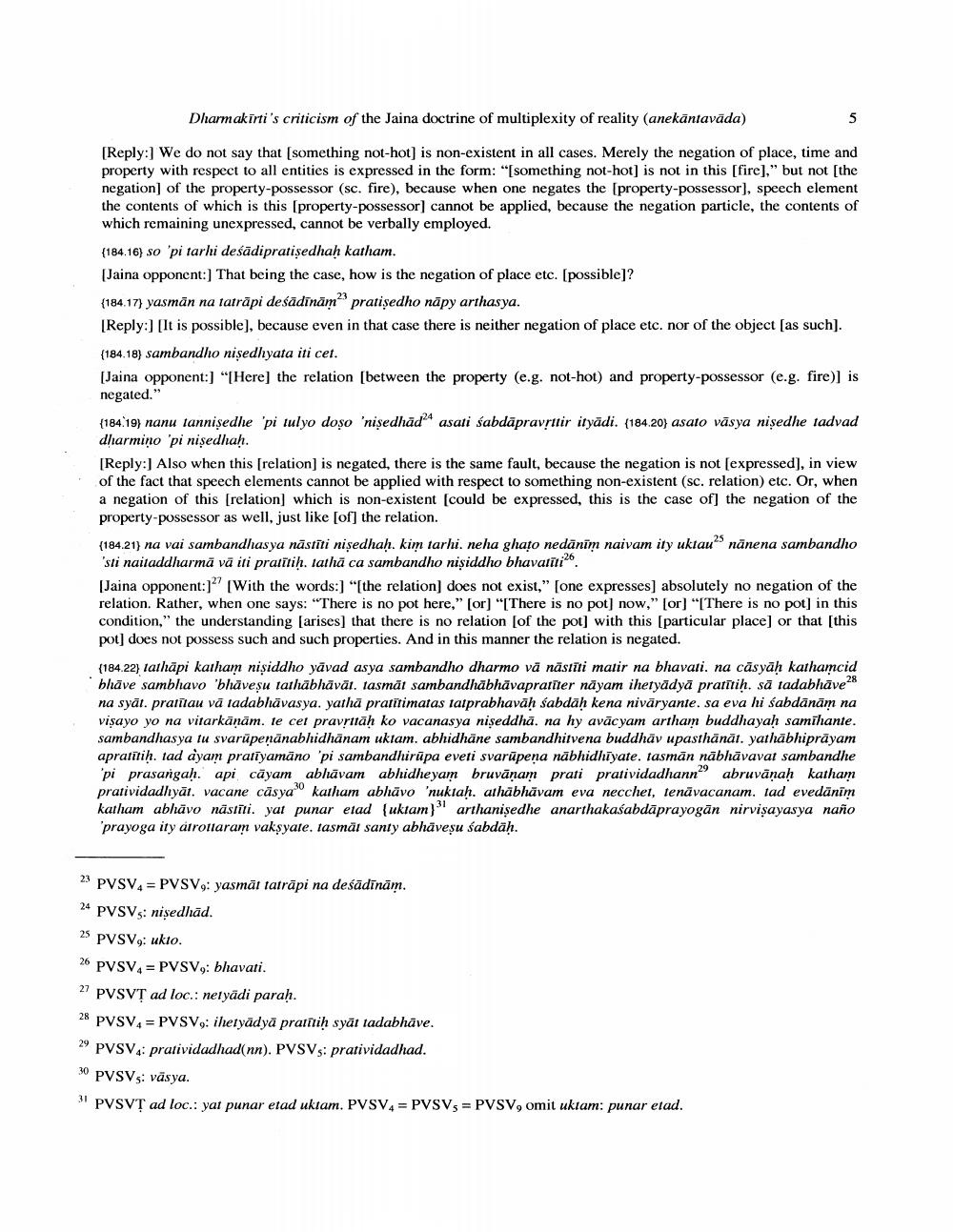Book Title: Dharmakirtis Criticism Of Jaina Doctrine Of Multiplexity Of Reality Anekantavada Author(s): Piotr Balcerowicz Publisher: Piotr Balcerowicz View full book textPage 5
________________ Dharmakirti's criticism of the Jaina doctrine of multiplexity of reality (anekāntavāda) [Reply:) We do not say that (something not-hot) is non-existent in all cases. Merely the negation of place, time and property with respect to all entities is expressed in the form: "[something not-hot] is not in this [fire)," but not (the negation of the property-possessor (sc. fire), because when one negates the property-possessor), speech element the contents of which is this (property-possessor) cannot be applied, because the negation particle, the contents of which remaining unexpressed, cannot be verbally employed. (184.16) so 'pi tarhi deśādipratisedhah katham. [Jaina opponent:) That being the case, how is the negation of place etc. (possible)? (184.17) yasmān na tatrāpi deśādinām pratiședho nāpy arthasya. [Reply:) [It is possible), because even in that case there is neither negation of place etc. nor of the object [as such). (184.18) sambandho nişedhyata iti cet. [Jaina opponent:) "[Here] the relation [between the property (e.g. not-hot) and property-possessor (e.g. fire)] is negated." (184.19) nanu tanniședhe 'pi tulyo doso 'nişedhād"4 asati sabdāpravsttir ityādi. (184.203 asato vāsya nisedhe tadvad dharmino 'pi nişedhah. [Reply:) Also when this [relation] is negated, there is the same fault, because the negation is not expressed], in view of the fact that speech elements cannot be applied with respect to something non-existent (sc. relation) etc. Or, when a negation of this [relation] which is non-existent (could be expressed, this is the case of] the negation of the property-possessor as well, just like [of] the relation. (184.21) na vai sambandhasya nāstīti nisedhah. kim tarhi. neha ghato nedānim naivam ity uktau2 nănena sambandho 'sti naitaddharmā vā iti pratitih. tathā ca sambandho nişiddho bhavariti Jaina opponent:] [With the words:) "[the relation] does not exist," [one expresses] absolutely no negation of the relation. Rather, when one says: "There is no pot here," (or) "[There is no pot] now," [or] "[There is no pot) in this condition," the understanding (arises) that there is no relation (of the pot) with this (particular place] or that [this pot) does not possess such and such properties. And in this manner the relation is negated. (184.22) tathāpi kaiham nişiddho yāvad asya sambandho dharmo vā nāstīti matir na bhavali. na cāsyāḥ kathamcid bhāve sambhavo 'bhāvesu tathābhāvāt, tasmāt sambandhābhāvapratīter nāyam ihetyādyā pratītih. sā tadabhāve28 na syāt. pratītau vā tadabhāvasya. yathā pratītimatas tatprabhavāh sabdah kena nivāryante. sa eva hi sabdānām na vişayo yo na vitarkānām. te cei pravrttah ko vacanasya nişeddhā. na hy avācyam artham buddhayah samīhante. sambandhasya tu svarūpenānabhidhānam uktam. abhidhāne sambandhitvena buddhāv upasthānāı. yathābhiprāyam apratītih. tad ayam pratīyamāno 'pi sambandhirūpa eveti svarūpena nābhidhīyate. tasmān nābhāvavat sambandhe 'pi prasangahapi cāyam abhāvam abhidheyam bruvānam prati pratividadhann" abruvānah katham pratividadhyāt. vacane cāsya katham abhāvo 'nuktah. athābhāvam eva necchet, tenāvacanam, tad evedānim katham abhāvo nästīti. yat punar etad (uktam)" arthanişedhe anarthakaśabdāprayogān nirvişayasya naño 'prayoga ity atroliaram vakşyate. tasmäl santy abhäveșu sabdah. 23 PVSVA= PVSV,: yasmāt taträpi na deśādinām. PVSVs: nişedhād. PVSV, ukto. PVSV = PVSV,: bhavati. PVSVT ad loc.: nelyādi parah. 28 PVSV = PVSV, ihetyädyä pratitih spät tadabhāve. PVSV4 pratividadhad(nn). PVSVs: pratividadhad. 30 PVSVs: vāsya. "PVSVȚ ad loc.: yat punar etad uktam. PVSV4 = PVSVs = PVSV, omit uktam: punar etad.Page Navigation
1 ... 3 4 5 6 7 8 9 10 11 12 13 14 15 16 17 18 19 20 21 22 23 24 25 26 27 28 29 30
